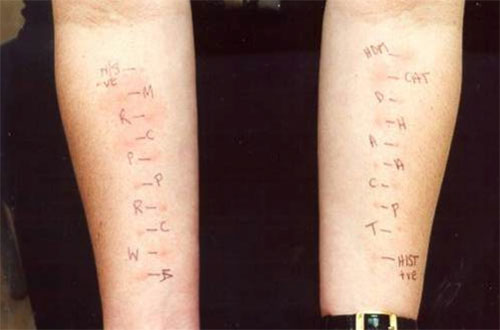Allergy skin testing seeks to identify the presence of the “allergic antibody”(IgE) to a substance to which a person might be allergic. The “allergic antibody” (IgE) detects a particular substance to which a person might be allergic, such as a species of grass pollen, cat, house dust mite or a specific food.
Skin tests are used to confirm or disprove a medical history that might suggest allergies.
Skin prick tests are usually performed with a commercial allergen extract prepared by a pharmaceutical company. A small drop of allergen solution is placed on the skin of the forearm and a small lancet is used to gently prick the skin through the drop of allergen solution. If allergic antibody is present on the histamine-containing cells in the skin then an itchy lump like a hive comes up in the area of testing. The tests are read at 15 minutes and the size of the swelling roughly correlates with the amount of specific allergic antibody in the system.
Positive skin tests usually subside over a couple of hours, although occasionally the swellings will persist for up to 48 hours.

Why perform allergy skin testing?
To determine if a person is allergic it is important to find out whether they have produced the “allergic antibody” (IgE) in their system. The absence of an antibody means allergy is very unlikely to that substance. If a person has the antibody then it means that an allergic condition is more likely.
Skin tests can confirm a history of a likely allergic event and provide an explanation for it. For example if a person has a reaction on eating a meal containing, among other things, nuts, and has a positive skin prick test to the type of nuts that were thought to be present, it is very likely that the reaction is due to the nuts. Skin prick tests also help doctors work out what allergens might be appropriate to offer desensitisation (immunotherapy) to.
What does a patient need to do?
We ask patients if they are taking antihistamines, and if so, to withhold them for 48 hours before skin prick testing. For some people this results in severe symptoms, and if this is the case, blood tests can be ordered instead of skin tests.
Some antidepressants, particularly drugs related to amitriptyline, will also affect skin prick tests. Drugs such as fluoxetine in the SSRI group of antidepressants can also cause problems in some instances. Let the doctor know and we can undertake blood tests as an alternative. It is not usually recommended, nor necessary to stop antidepressant medications.
All other medications can, and should, be taken as usual. This especially includes asthma medications and corticosteroids.
On the day of testing, we perform the tests on your forearm, so wear something with sleeves you can take off or unbutton.
Side Effects
Does it hurt?
Skin tests are usually well tolerated, even by children. The lancets that are used to prick the skin are very small and we aim not to draw blood at all.What happens in a positive skin test?
A positive skin prick test will cause a small itchy lump in the skin. This will usually disappear over a couple of hours. Occasionally large reactions may be visible in 24 hours but these also disappear over 48 hours. When it occurs, this is called a “late reaction” and generally means you are very sensitive to that allergen.Can I get a bad reaction to skin prick tests?
Very rarely skin prick tests can cause anaphylaxis or a severe allergic reaction. This is almost unknown when testing for inhalant allergens but can occur with a risk of about 1:16,000 when skin tests are performed to a substance to which a person has had anaphylaxis. Because of this small risk we often prefer to test for specific IgE in the blood when a person has had anaphylaxis, at least in the first instance.Are there any reasons not to do skin prick testing?
Generally we prefer not to undertake skin tests in pregnant women: blood tests can usually be substituted.If a person has significant asthma which is unstable, this is also a good reason not to perform skin prick testing on that day as this increases the risk of a severe reaction.
People with severe eczema can get extremely itchy in response to skin prick tests so that blood tests may be preferred in this instance.
Some people have very reactive skin: “dermographism”, especially patients with urticaria. If this is the case the skin tests will all be positive, very itchy and are usually unhelpful for diagnosis, so we try to avoid doing them if this is the case.
Antihistamines and some antidepressants can interfere with skin prick testing. Let your doctor know if you are on these medications so that testing can be deferred, antihistamines withheld or blood tests undertaken instead if this is the case.
For more information visit ASCIA Allergy Testing
Make an appointment with Melbourne Allergy Asthma & Immunology Consultants to find out if skin testing is right for you.
Level 1, Suite 123
Chelsea House
55 Flemington Road
North Melbourne VIC 3051
Getting Here
